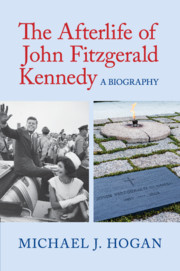Book contents
- Frontmatter
- Dedication
- Contents
- Acknowledgments
- List of Abbreviations
- 1 The Afterlife of John Fitzgerald Kennedy: An Introduction
- 2 All the World's a Stage: Constructing Kennedy
- 3 From History to Memory: Assassination and the Making of a Sacred Symbol
- 4 Ritual and Remembrance: Cultural Trauma, Collective Memory, and the Funeral of John Fitzgerald Kennedy
- 5 In Death There Is Life: Monuments of Paper and Pen
- 6 In Death There Is Life: Monuments of Glass, Steel, and Stone
- 7 The Memory Wars: Contesting Kennedy
- 8 Gone but Not Forgotten: History, Memory, and Nostalgia
- Notes
- Selected Bibliography
- Index
4 - Ritual and Remembrance: Cultural Trauma, Collective Memory, and the Funeral of John Fitzgerald Kennedy
Published online by Cambridge University Press: 23 March 2017
- Frontmatter
- Dedication
- Contents
- Acknowledgments
- List of Abbreviations
- 1 The Afterlife of John Fitzgerald Kennedy: An Introduction
- 2 All the World's a Stage: Constructing Kennedy
- 3 From History to Memory: Assassination and the Making of a Sacred Symbol
- 4 Ritual and Remembrance: Cultural Trauma, Collective Memory, and the Funeral of John Fitzgerald Kennedy
- 5 In Death There Is Life: Monuments of Paper and Pen
- 6 In Death There Is Life: Monuments of Glass, Steel, and Stone
- 7 The Memory Wars: Contesting Kennedy
- 8 Gone but Not Forgotten: History, Memory, and Nostalgia
- Notes
- Selected Bibliography
- Index
Summary
As we have seen, people felt close to President Kennedy, or at least to the persona he projected, so close that his death struck them as a personal loss. They reacted with shock and dismay, a vast outpouring of grief, a profound sense of guilt for whatever part they may have played in the tragedy, and deep-seated fears and doubts about the future, including doubts about their own identity as a people and their ability to cohere as a nation. Much of this reaction was spontaneous and highly emotional, though it later became more controlled and organized as the period of mourning moved from the president's assassination through the funeral planning and burial that followed. The same period, moreover, witnessed a general tendency to ennoble the slain president. In a nation wounded by guilt, its faith in the future shaken, Kennedy assumed heroic status. His already popular image was polished in ways that enabled Americans to feel whole again, proud of their place in the world and of the values both they and their fallen leader seemed to personify.
This is not an unfamiliar process. According to the great French sociologist Emile Durkheim, not to mention his many followers over the generations, most cultures have funeral rites of passage that aim to move the dead from the world of the living to whatever lies beyond. But the same rituals are about the living as well, and are designed to serve important social purposes. If mourning the death of a loved one is an obligation imposed on the family, which feels diminished by its loss, it is no less a duty imposed on the whole community when death strikes down a head of state whose life seemed to embody elements of character identified with the nation itself. Just as a family reacts to its loss by coming together in the shared sorrow of a funeral, and just as this process can spur renewed hope and family spirit, so the nation is summoned to mourn the death of the hero-patriot in a collective grief that can inspire a resurgent sense of strength, shared identity, and common purpose.
In Kennedy's case, much of this inspiration derived from the theatrical elements that marked his funeral, which resembled in many ways a dramatic rendering staged by the state in active collaboration with the president's widow, family, and friends.
- Type
- Chapter
- Information
- The Afterlife of John Fitzgerald KennedyA Biography, pp. 68 - 100Publisher: Cambridge University PressPrint publication year: 2017



